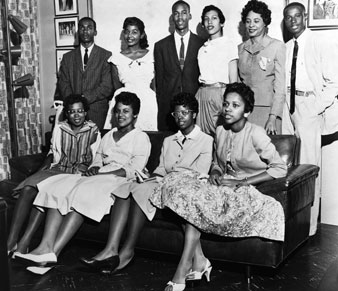 Everett CollectionThe ‘Little Rock Nine’ and Daisy Bates in living room during the the federally enforced desegregation of Central High School
Everett CollectionThe ‘Little Rock Nine’ and Daisy Bates in living room during the the federally enforced desegregation of Central High School
Governor Faubus has unwittingly moved the desegregation issue into a new phase. Specifically, his ignoble putsch has had these effects:
1. Put Southern liberals on the spot in a new and painful manner. At no time in his career, for example, has the silent Senator J. William Fulbright had so many editorial fingers pointed directly at him, nor has he ever appeared in a less attractive light.
2. Sharpened the clash between segregationists and integrationists in a strategically important state.
Former Governor Sidney McMath and Little Rock’s Mayor W. W. Mann must now attempt to capture control of the Democratic Party in Arkansas. Should they succeed, they will emerge in control of the first Southern Democratic Party which has disavowed white supremacists.
3. Precipitated an open rebellion against federal authority in a state and setting in which the outcome cannot be in doubt. Better that the test came in Arkansas than in Mississippi or South Carolina; better, too, that it occurred in a setting in which the alleged need for state troops to maintain order can be so massively refuted.
4. Put Democratic “gradualists” and “moderationists” back on the griddle from which Senator Lyndon Johnson had sought, through enactment of the civil rights bill, to rescue them. As The New York Times points out, Faubus has knotted “the civil-rights albatross firmly around the neck of the entire Democratic Party.”
5. Shocked and dismayed Southern conservative opinion (as we predicted it would in an editorial which appeared in the September 14 issue). The Nashville bombings, which came in its wake, caused extensive and costly damage to a valuable school property. The implications of such incidents do not need to be emphasized to Southern conservatives.
6. Undermined the position of the White Citizens Councils and other obstructionists. Both in Little Rock and Nashville, the reaction against these elements has been impressive.
7. Brought the challenge which was implicit in the Dixiecrat Manifesto of March 11, 1956, into the open. The Administration has no alternative now but to meet the challenge head on.
8. Finally, it has stiffened the national resolve that the Constitution be enforced throughout these United States. Where Northern opinion was once wavering or indifferent, it is so no longer. The photographs of Negro children being barred from tax-supported public schools by National Guardsmen and of Negro children being heckled and harassed by screaming crackpots and hoodlums, have had a tonic effect on national opinion. Once again the South has made the mistake of drawing its sword first; no longer will well-meaning citizens, North, South, East or West, be intimidated by the “federal troops and bayonets” argument.
All this is not to imply that we are grateful to Arkansas’s Governor for his action; quite the contrary. But this is not the first time that a self-seeking demagogue has appealed to the “better angels of our nature” by overplaying his hand. Nor do we imply approval of the President’s handling of the issue. Apparently the President felt compelled to grant Faubus an interview at the behest of Representative Brooks Hays, but a more fitting reply would have been to tell the Governor to comply with Judge Davies’ order—first. Nor is it, as we have pointed out before, that we advocate the use of “federal troops and bayonets.” The use of force is implicit in any court order or decree; the only real issue is what kind of force, how much, when and where applied, by whom, and for what purpose. We have never thought that it would be necessary to use federal troops to secure compliance with the Court’s order; nor do we think so now. The President has ample powers; faced with the kind of challenge that has arisen in Little Rock, his authority clear. But no more than any Chief Executive should the President say, as he has said, that he would not use federal troops, for it is quite apparent that he would use them—that he must use them—if other means fail. Nor are we impressed by what the President has said about morality and law; legislative power has been used not once but many times to change the mores. The “morality” of the desegregation issue was settled nearly a century ago; the terms of the settlement are embodied in the Fourteenth Amendment. No one expects the President, or Congress for that matter, to change the morals of the South; but the President cannot permit final decrees of the Supreme Court to be flouted without violating his oath of office.


